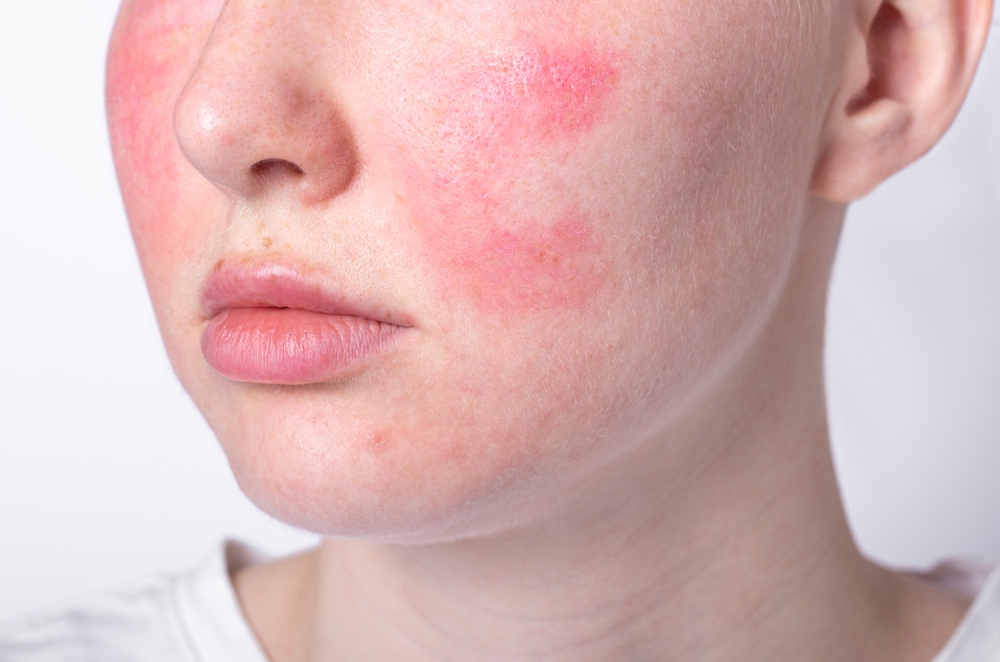Rosacea is a chronic skin condition that impacts people of all skin types and lifestyles. Thanks to advances in dermatological science, there is now an array of different treatment options to manage and alleviate the symptoms of rosacea.
What is Rosacea?
Rosacea is an overarching term to describe various skin manifestations experienced by patients. There are four subtypes of rosacea, and it is common for people to have more than one type. Persistent redness, associated with episodes of flushing, as well as visible blood vessels on the face is most consistent with erythrotelangiectatic rosacea. Acne-like breakouts, including small red pus-filled bumps, are called papulopustular rosacea. Phymatous rosacea is most commonly seen in men and involves bulbous changes of the nose, and ocular rosacea can present with eye symptoms (e.g., dryness, grittiness). While the cause of rosacea is not completely understood, it is known that certain environmental factors can trigger it including heat, spicy foods, alcohol, and hot beverages.
There are many treatment options for rosacea based on the subtype(s) you have.
Topical Treatments
Topical therapy is commonly used to treat rosacea. These medications are applied directly on the skin and can help control inflammation and redness. Common active ingredients include metronidazole, azelaic acid, and ivermectin, all of which help to decrease inflammation, as well as oxymetazoline, which helps to reduce background redness.
Oral Medications
For more severe cases, dermatologists may recommend an oral medication to help improve the manifestations of rosacea. Commonly, antibiotics such as doxycycline or minocycline, are prescribed to decrease inflammation and improve papulopustular flares.
Lifestyle Modifications
Lifestyle changes are quite effective at decreasing the flares of rosacea. In fact, keeping a journal of triggering factors will help you to avoid culprits. Common triggers include spicy foods, hot beverages, alcohol, and extreme temperatures. Rosacea skin tends to be very sensitive; therefore, a gentle skincare routine, using mild, fragrance-free products is recommended. It is also important to wear sunscreen daily, as sunlight is a known trigger for rosacea.
Laser and Light Therapies
With the advancement of technology, there are many lasers and light therapies available to treat erythrotelangiectatic rosacea. One of these modalities is called intense pulsed light (IPL), which targets blood vessels to reduce redness and improve your overall skin tone. At Embrace Dermatology + Aesthetics, we conveniently offer IPL treatment at both our Philadelphia and Spring House locations.
The Comprehensive Approach
Treatment of rosacea in Philadelphia involves a comprehensive approach. In order to provide effective therapy, your subtype(s) of rosacea must be correctly diagnosed. From here, treatment may involve a combination of topical and oral medications, lifestyle modifications, and possibly laser therapy. At Embrace Dermatology + Aesthetics, we will work closely with you to tailor a treatment plan that addresses your specific symptoms, triggers, and concerns.
Contact Us
From topical and oral medications to lifestyle modifications and cutting-edge laser therapies, the treatment options for rosacea continue to improve and expand. If you or someone you know is searching for a dermatologist in Spring House, PA to treat rosacea, consult with one of our experienced dermatologists at Embrace Dermatology + Aesthetics! Call for an appointment and be on your way to having clearer skin and more confidence than ever before!

